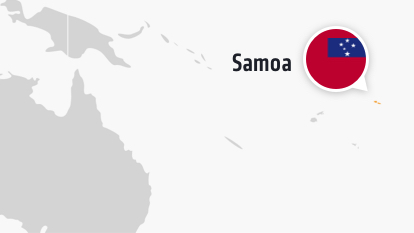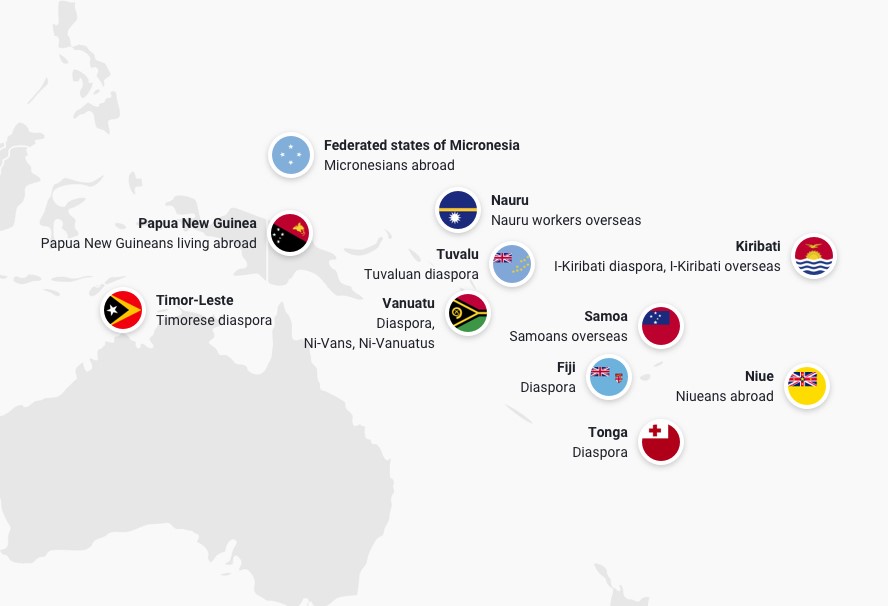Pacific
This page provides an overview of diaspora engagement in the Pacific region. It draws on knowledge gathered during the mapping of 12 countries to study relevant policy and institutional frameworks, trends, good practices and recommendations at regional level. A long-form version of the Pacific regional overview is available to download.
Regional legislative and policy frameworks on diaspora engagement issues in the Pacific have started developing very recently. The only regional organisation addressing diaspora engagement in the Pacific is the Melanesian Spearhead Group (MSG), an intergovernmental organisation composed of the four Melanesian countries of Fiji, Papua New Guinea, Solomon Islands and Vanuatu.
Despite the relatively small population of the region, several Pacific countries have very significant diasporas abroad. Nevertheless, policy and institutional frameworks on diaspora engagement are lacking in the majority of Pacific countries. For instance, none of the twelve countries mapped have developed an official policy or strategy for diaspora engagement. In addition, out of the twelve Pacific countries included in the mapping, only Samoa has put in place an institution dedicated to diaspora issues.
Several developments aimed at strengthening diaspora engagement have emerged in the region over the past few years.
After the earthquake and tsunami that hit Samoa in 2009, as much as 90% of disaster-affected households received international remittances from the Samoan diaspora, and 72% of these were sent within a week after the event.
In the aftermath of Tropcial Cyclone Winston, the Fijian government received donations from various Fijian diaspora communities throughout the world.
Samoa was the first in the region to put in place an institution dedicated to diaspora issues – the Samoa Diaspora Relations Unit, which started communicating with Samoan communities abroad in 2019.
The Government of Papua New Guinea established a PNG Labour Mobility Unit (LMU) with the objective of increasing the number of workers sent to Australia and New Zealand each year.

The Government of Fiji has made a priority of improving the attractiveness of the country as an investment destination for the Fijian diaspora. As part of this effort, in recent years, the Fijian government has reached out to several of the main Fijian diaspora communities abroad and encouraged them to invest in Fiji. In addition, in 2019, the government launched a national digital transformation programme – which includes tools such as the BizFIJI information portal – to stimulate investments from the diaspora. The country has successfully reached out to its diaspora to assist with relief and rehabilitation efforts when affected by natural disasters, and it is also committed to preserving Fiji’s language and culture in its diaspora.

This is the only country mapped in the region to have set up an institution dedicated to diaspora issues: the Samoa Diaspora Relations Unit. The Samoan government also supports and encourages its citizens to work overseas, especially through seasonal work programmes in New Zealand and Australia. The Samoan diaspora gets actively involved in relief and rehabilitation efforts during natural disasters in the country, and Samoan diaspora communities abroad are actively engaged in cultural preservation activities.

The Government of Tonga is deploying targeted efforts to encourage the flow of remittances into the country’s economy, notably by working to reduce the costs of remittances sent by the diaspora. Tonga has succeeded in strengthening its collaboration with the diaspora by implementing several favourable policies over the past decade. Tongans overseas are allowed to take part in national elections and to retain their Tongan citizenship if they become citizens of another country. Finally, the government is also working to increase trade in services channelled through Tongan visitors to the country, as the Tongan diaspora is becoming increasingly important for the country’s tourism industry.
With the exception of Timor-Leste, all twelve countries mapped have English as one of their official languages. As a result, certain common trends emerge in the terminology used by respective governments, with terms such as overseas citizens and citizens living abroad being regularly employed in official communications. The term ‘diaspora’ is also used in official policies and government communications in seven out of the twelve countries mapped.

The lack of appropriate policy and institutional frameworks is a major obstacle to further diaspora engagement in the Pacific region. Governments should make a priority of strengthening legislative and policy frameworks in this area, as well as establishing institutions dedicated to diaspora engagement issues. In this respect, initiatives such as the Diaspora Relations Unit set up by the Samoan Government should be encouraged.
In order to enable greater engagement of the diaspora, in particular in the domains of investment and tourism, authorities must ensure that access to information for diaspora communities abroad is improved. Digital transformation programmes and online information portals are good practices to build on.
As Pacific diasporas actively engage in the promotion and preservation of their cultural heritage and identity in the host countries in which they live, Pacific countries of origin should support their diasporas in maintaining cultural connections. Traditions and culture remain intrinsically linked to the perpetuation of diasporic identities. Activities that enable diaspora communities to maintain their cultural heritage over time and pass it on to new generations are therefore real assets for the sustainability of diaspora engagement in the Pacific.
Improving data collection on diaspora communities abroad and establishing permanent dialogue with them are key areas that donors and implementing agencies should explore. This could enable governments to better understand and respond to the needs of their diaspora communities, thereby creating favourable conditions for sustainable and balanced engagement. In this context, initiatives such as the collaboration between the Government of Fiji and IOM in the framework of the project ‘Engaging with Diaspora for Fiji’s Development’ could be replicated in other countries in the region.
In order to consolidate the role of Pacific diasporas as humanitarian actors in the region, in particular when countries of origin are affected by natural disasters, it is necessary to ensure effective coordination and communication between Pacific governments and diaspora communities involved in relief activities.